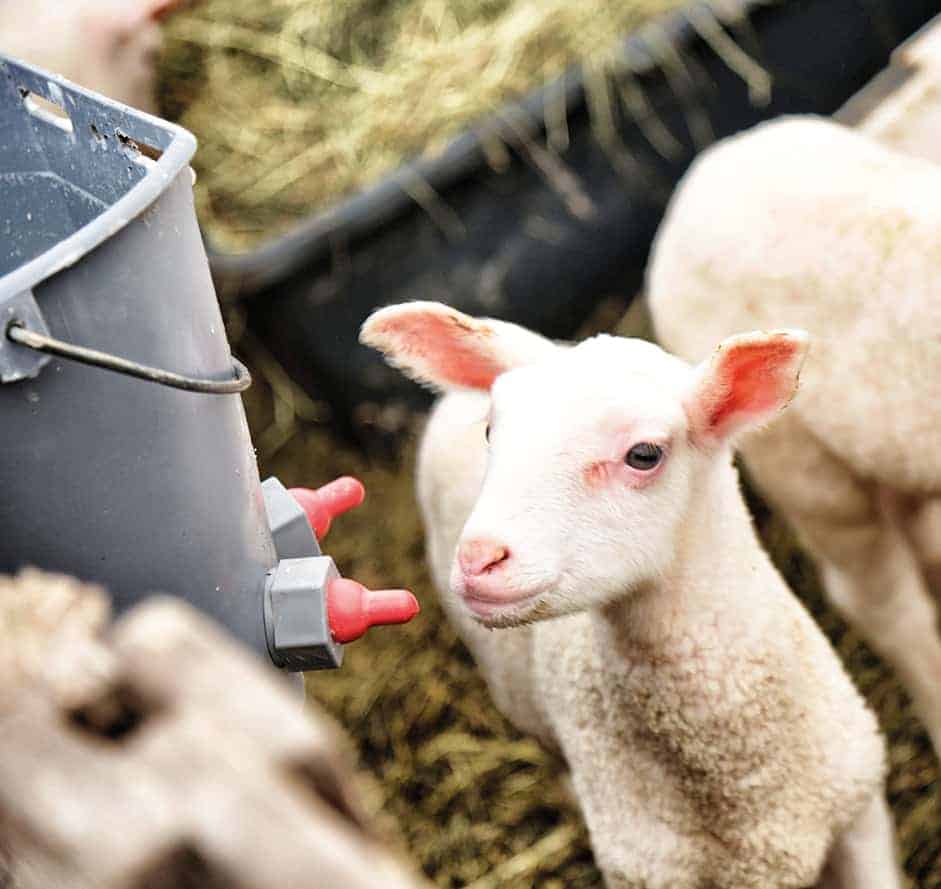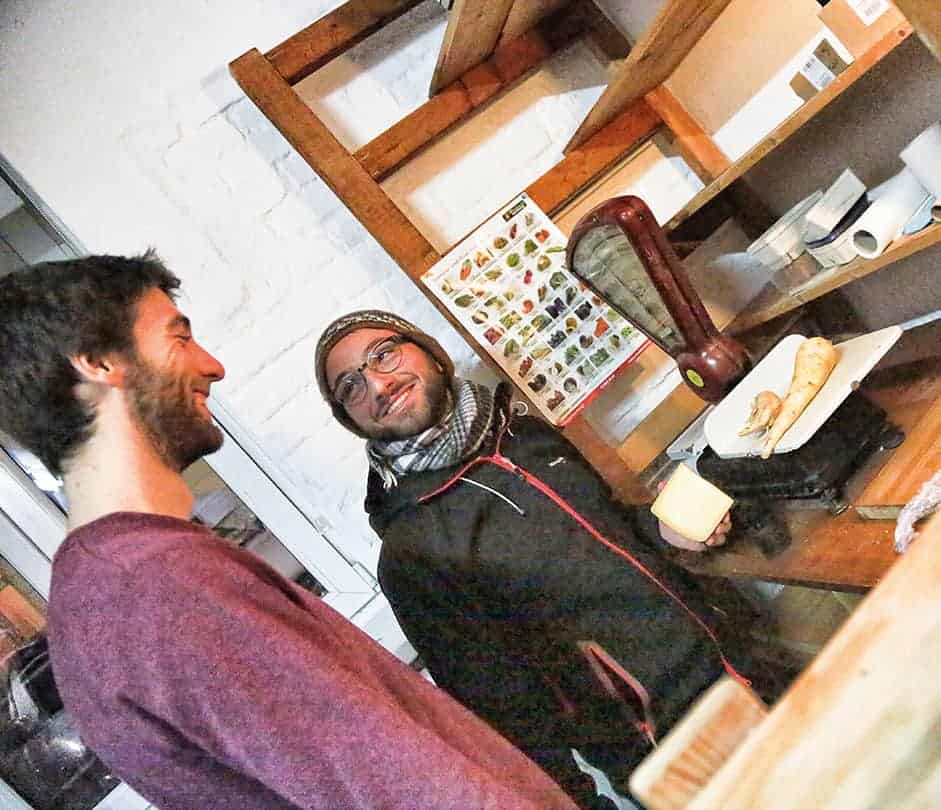Yellow crocuses, orange gerberas and pink cosmees bloom on a lush meadow. Two butterflies flutter in the fowl cloud sky. The colorful meadow is to be regarded in the Kühlregal of a supermarket. She does not smell like flowers. It is odorless and adorns a plastic cup on which sour cream is written. "At the supermarket you have to believe what you buy. Here you see it! ", Says Mark-Rene Uchida and points to the Haschahof on the southern outskirts of Vienna, where he works as the" right-hand man "of organic farmer Rudolf Hascha.

The farm with sheep, chickens, grain and vegetable cultivation wants to lead people "to the origin of food". Where do the foods that I eat and drink every day come from? Under what conditions are they manufactured? Who benefits? Members of food cooperatives, the so-called Foodcoops, have clear answers to these questions, of which there are 18 in Austria and XNUMX in Vienna. Together they buy groceries directly from local organic farmers such as the Haschahof.
What are food coops?
Bioparadeis in the 18th district, which has over 70 members, was an established food coops. “From a certain size, it becomes difficult. It is important that it remains clear. Otherwise there are too many responsibilities, ”says Bianca Hopfner, who looks after new Foodcoops members and currently has to communicate an admission freeze.
There are several working groups in which each member should do rotating services. The purchasing department sends the online collection orders, the sales department checks the deliveries and helps to collect the ordered products, the dining trip organizes visits to organic producers, the finance working group manages the foodcoop account.
“Working group meetings amount to around seven to eight hours a month,” says Michael Bednar, who is a member of Foodcoops Einkorn in the 16th district. A plenary takes place once a month, in which the members talk about news and organizational matters such as a logo competition for the Naschkastl 2.0. The community communicates several times a week via an online forum and an e-mail distribution list.
Each member pays a monthly membership fee of about ten euros to cover the storage rent and running costs. In addition, each member books an arbitrarily high purchase credit on the common Foodcoop account. The prices are comparable to those in organic supermarkets, except that the money goes to the producer. "Vegetables are more expensive. Dairy products cost about the same as in the supermarket, "says Bianca Hopfner.
Online order for a week
Perishable products such as milk, fruit and vegetables are pre-ordered online using tables via the Foodsoft ordering software for the coming week and the order is sent by the responsible person for purchasing after a deadline. Cereals, beans, lentils, wine, juices, teas, herbs are available in stock and can be purchased without ordering. Large quantities of citrus fruits are now and again sourced from organic farmers from abroad. "It's like Christmas, when there are citrus fruits," rejoices a Einkörnerin. Product suggestions can be submitted by members. Again and again sample orders are made.
Foodcoop: Freshly delivered & fetched together
Producers like the Krautwerk bring the ordered products directly to the Foodcoop. For companies that do not deliver, carpools run. BerSta, a middleman for organic products, works with many food coops to deliver dairy products and bread.
An evening in the week is pick-up day for all members. The responsible store service compares the orders and deliveries with each other. "Sometimes something is missing or is spoiled, that is then noted," says Michael Einkorn.
Everyone is responsible for themselves. Cheese is weighed, eggs are counted and food is packed in tramping bags for one week. The packaging materials are brought by yourself. Empty, used egg boxes from the supermarket are available on shelves. The collection of food is cashless. Each member has transferred credit in advance. In the warehouse is a folder with printed account sheets for each, where he manually enters the total price of his groceries and the remaining balance.
Foodcoops - mentality connects

"There is a foodcoop, as everyone gets a box prepared by the sales department with his order," says Ada Sedlak from Foodcoop Naschkastl 2.0 in plenary. The majority thinks then that the social goes down. "True," says Ada, so you could "gossip a little between milk and eggs". Organic farmer Claudia vom Krautwerk sees "great potential" in food coops. She observes that more and more young parents are shopping consciously. For working people with children and households, she sees the regular services that each Foodcoop member must do, in terms of time, as inappropriate. You can imagine that specially selected people are paid for services. "In the end, it's not the age or the job that connects us, it's the mentality," says Niko from Bioparadeis.
"The membership limit is relatively constant. The people who are there know that they will not get in again so quickly, "says Michael Bednar. Bianca Hopfner is disappointed that she has to reject those who are interested. She likes to pass on links to other food coops that you can write to. When Naschkastl 2.0 in 20. For example, there are still places available in the district. "It's not up to a foodcoop to expand foodcoops," Einkorn says. "The hardest thing is the search for space. It takes no one off, "agree Bianca and Michael. One would like to give tips on structure and inputs for a start-up. However, a new foodcoop does not have to be a copy.
Not 100% of the diet
"I felt incapacitated in the supermarket," says Michael. He wants to decide for himself what, by whom and in what quantities he buys. Open refrigerated shelves in heated supermarkets are also energy inefficient. "If I force myself to adhere to my principles 100-percentively, life is not fun," says Michael. He likes it to do 80 percent of his diet through the cooperative. He bought sour cream in the supermarket.
Foodcoops: conclusion of the author
Pros: Transparency, contacts with organic producers, conscious diet and lifestyle, money goes directly to producers, sense of community with like-minded people, contribution to society / environment, self-responsibility, control over consumption.
Contra: Weekly shopping without spontaneity, time-consuming services, sometimes errors in the order, you contribute errors of others, constantly emails, higher costs, no anonymity, even middlemen, slow decision-making.
Recommended by Foodcoops:
Regional organic producersHaschahof
Here you can pick organic vegetables in a plot to be rented by 860. The Hashahof orders the field and seeds 20 different species. In addition to the Pflückgärten there are 120 hens with 500 m2 spout and 40 ewes. From the farm are available in addition to their own organic products purchased.
www.haschahof.atHegihof
The Hegihof is run by Bernhard Rzepa, who feels called to organic sheep farmer. His 60 East Frisian dairy sheep are milked in the morning and in the evening by hand. For yoghurt production the organic farmer uses the untreated, fresh raw milk. There is no pasteurization. The lactic acid bacteria are added daily after milking. The yoghurt is sweetened with local acacia honey. www.hegi.atWalter Jani
The trained druggist has been processing home-grown herbs into teas, creams, shampoos and body oils for 35 years. He also cultivates cereals such as spelled or rye. He bakes bread and pastries in the brick oven or creates noodles from lasagne leaves to spaghetti. Home-brewed beer is also available in the assortment.
walter.jani@gmx.atherb plant
The Krautwerk is managed by the newcomers Claudia and Robert Brodnjak. As customers for their organic carrots & Co., Claudia and Robert do not want resellers, but end consumers. On Saturdays the Krautwerk sells its products at the Karmelitermarkt in 1020 Vienna. www.krautwerk.at
More information about sustainable consumption here.
Photo / Video: Katharina Führer.


